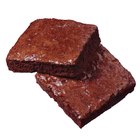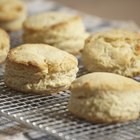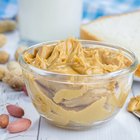
Choosing the right type of butter may seem easy. Generally, the only varieties you'll see on the store shelf are salted and unsalted, but each type has its own uses. Butter can be good for up to six months if you store it in the freezer, so even if you use one type more than the other, it's a good idea to keep both on hand.
Differences
As their names suggest, salted and unsalted butter are generally identical other than the salt content. The exact amount of salt that's added to a batch of salted butter varies depending on the manufacturer. Another main difference between the two is that unsalted butter may be fresher. Salt acts as a preservative, so salted butter can last about two weeks longer on a grocery store shelf and in your refrigerator.
Cooking with Salted Butter
Salted butter is most often used in cooking savory dishes. The saltiness adds flavor to sauces or soups. Adding salt yourself can lead to the dishes tasting overly salty, but the small amount of salt in the butter controls the amount of flavor. For instance, adding salted butter to mashed potatoes will make them creamy and will add just the right amount of saltiness. This type of butter is also ideal as a topping. Spread salted butter on bread or melt some over steamed vegetables.
Cooking with Unsalted Butter
Unsalted butter is used in virtually all baked goods. Recipes for cookies, cakes, and pies will generally call for unsalted butter. The salt content in salted butter will overpower the sweet flavor of these treats. If a recipe for a sweet dish doesn't specify what type of butter you should use, assume that you should use unsalted. Unsalted butter is also ideal for cooking any dish for a person who is trying to limit his salt intake.
Substitutions
It's easy to substitute unsalted butter when making a recipe that calls for salted. Add an extra pinch of salt per tablespoon of unsalted butter, or slowly add salt a pinch at a time and taste the dish until it tastes right. Substituting salted butter for the unsalted variety is not generally a good idea, and should never be done if the recipe doesn't call for salt as well. If the recipe does call for salt, decrease the amount by a quarter teaspoon for every half cup of salted butter you use. Many seasonings such as dry salad dressing mixes also contain salt, and if your recipe directs you to combine dry mix with butter, use unsalted butter.
Related Articles

Can You Substitute Butter for ...

What Can I Substitute Unsalted Butter ...

How to Make Salt Brine

Can I Put Butter in Brownie Mix Instead ...

Is Cabernet Sauvignon a Substitute for ...

How to Dissolve Cooking Flour

Butter Substitute for Baking Scones

How to Make Creamy Alfredo Sauce With ...

Epsom Salt for Bruises

What Is Gray Salt?

What Is Accent Seasoning?

How to Cook a Whole Fish Jamaican Style

The Nutrition of Fresh Ground Peanut ...

How to Make Electrolyte Water With Salt ...

Calories in Bread Pudding

Salt Vs. Non-Iodized Salt

How to Make Black Butter

List of Pore Clogging Ingredients

How to Substitute Splenda for Sugar

What Happens if You Mix Margarine and ...
References
Writer Bio
Cooking, travel and parenting are three of Kathryn Walsh's passions. She makes chicken nuggets during days nannying, whips up vegetarian feasts at night and road trips on weekends. Her work has appeared to The Syracuse Post-Standard and insider magazine. Walsh received a master's degree in journalism from Syracuse University.
Photo Credits
Comstock/Comstock/Getty Images